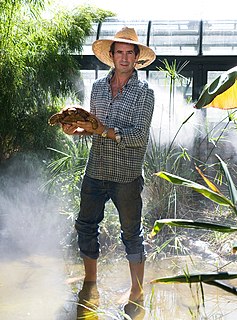A Quote by Teresa Palmer
I'm very much into animal welfare.
Quote Topics
Related Quotes
Not only are the philosophies of animal rights and animal welfare separated by irreconcilable differences... the enactment of animal welfare measures actually impedes the achievement of animal rights... Welfare reforms, by their very nature, can only serve to retard the pace at which animal rights goals are achieved.
I'm convinced that welfare reforms deserve our support, both because they are better (or at least much less bad) for the animals involved (the Golden Rule), and because they push the envelope, moving us closer to the compassionate world that all animal rights activists are working toward...On the other hand, working toward welfare reforms has the immediate benefit of helping improve animals' lives today and acts as a crucial stepping stone toward animal liberation.
I'm not into animal rights. I'm only into animal welfare and health. I've been with the Morris Animal Foundation since the '70s. We're a health organization. We fund campaign health studies for dogs, cats, lizards and wildlife. I've worked with the L.A. Zoo for about the same length of time. I get my animal fixes!
I believe that the best way to create good living conditions for any animal, whether it's a captive animal living in a zoo, a farm animal or a pet, is to base animal welfare programs on the core emotion systems in the brain. My theory is that the environment animals live in should activate their positive emotions as much as possible, and not activate their negative emotions any more than necessary. If we get the animal's emotions rights, we will have fewer problem behaviors... All animals and people have the same core emotion systems in the brain.
For me the two biggest issues are climate change and animal welfare/animal agriculture. And oddly enough animal agriculture is such a contributor to climate change. According to the United Nations, 25% of climate change comes from animal agriculture, so every car, bus, boat, truck, airplane combined has less CO2 and methane emissions than animal agriculture.
To be proactive is to educate yourself and get the word out via social media, or through one of the many animal-welfare organizations around the world, and by signing petitions, starting your own campaigns, rescuing and fostering animals, organizing cleanups, recycling, volunteering at your local animal shelter, going to eco-tourist destinations or photo safaris. This will help get the word out to the masses, and hopefully, this will bring more awareness and more compassion to animal welfare.
Whatever the reason, for most of the present century, the literature and publicity of the old established [animal welfare] groups made a significant contribution to the prevailing attitude that dogs and cats and wild animals need protection, but other animals do not. Thus people came to think of "animal welfare" as something for kindly ladies who are dotty about cats, and not as a cause founded on basic principles of justice and morality.


































